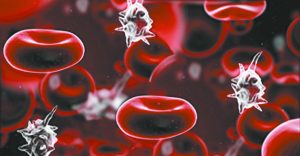By Candice R. Taylor, MSN, BSN, RN – Sepsis Coordinator, Ocala Health
 Why do I need to know about sepsis?
Why do I need to know about sepsis?
Sepsis has become the world’s #3 killer! It is known to cause more deaths in the U.S. than AIDS, prostate cancer and breast cancer combined. As incredible as this may sound, each year 25 to 50% of people who get sepsis die. It is not a particular disease, and it can kill anyone! After all, it does affect more than 1 million Americans each year. It has quickly become the most expensive condition to treat in the U.S. Sepsis also has four stages to it, with septic shock being the worst. Septic shock can cause organ failure or tissue damage, just the same as a heart attack or stroke. One way shock has worsened over the years is by people not finishing the prescribed antibiotics from their physicians. This causes bacteria in the body to lay dormant and grow resistant over time to the medications that are supposed to stop and heal infections. So what do you do? Please talk to your doctor about sepsis, because you or a loved one’s life may depend on it.
Where does sepsis come from?
Sepsis is a severe response in the body to a foreign bacteria, fungus, or virus. Foreign substances in the body can cause infections. The body reacts to these infections with severe inflammation. The severe inflammation can cause organs to quit working. This is why sepsis is considered a medical emergency that needs immediate attention. Sepsis can lead to long-term illnesses and treatments, which can cause long-term hospitalizations, or possibly death.
Who does sepsis affect?
Sepsis can have a serious effect on people who are elderly, young children, people with cancer, or people who have weakened immune systems. These people can develop sepsis quicker than healthy people and it can cause serious or deadly outcomes. People diagnosed with sepsis need to be monitored closely when sick, preferably in a professional medical setting. Sepsis is not a new disease; it has been around for ages. Hundreds of years ago, sepsis was called “blood poisoning.”
Sepsis may become an issue for people who have the following illnesses or disease processes:
• Urinary tract infection
• Pneumonia
• Influenza (Flu, any strain)
• Stomach infections
• Kidney infections
• Bloodstream infections
• Recent surgical candidates (any surgery)
• Urinary catheters (temporary or long-term use)
• Appendicitis
• Gallbladder infection
• Skin lesions or swelling (Cellulitis)
• Bone infection (Osteomyelitis)
• Heart infection (Endocarditis)
How do I know if I have sepsis and what do I do?
There are certain symptoms people will experience with sepsis. However, if there is more than one symptom being experienced, a doctor’s appointment should be made right away to be checked for sepsis. If you cannot get into your primary care provider’s office immediately, please go to the nearest emergency room to be checked for sepsis symptoms. If you are feeling very ill and have more than three symptoms, call 911 and ask to be taken to the nearest hospital for treatment of sepsis.
Sepsis symptoms could include:
• Fever of more than 100.9 F or less than 96.8 F
• Heart rate feels faster than normal or feels like it is skipping beats
• Breathing becomes difficult, or you seem out of breath easier
• You may have a hard time urinating, find that very little urine comes out or that you are urinating in small amounts frequently during an hour
• Your skin may look pale or red compared to normal
• Cold chills may be felt, or your body may shiver uncontrollably
• You may feel very tired, or sleepier than normal for hours or days (without any reason)
• Nausea, vomiting and diarrhea may appear for no reason (not related to another illness, treatment, or medication)
• Your appetite changes; you will not feel like eating anything or drinking anything
• Things may seem more confusing than normal
• Speech can become slurred, or people comment they have a hard time understanding you
• The body has severe muscle pain or cramps for no reason
• Dizziness can cause loss of balance, or blackouts could occur
• Your blood pressure seems lower than normal for you (especially the top number [systolic])
• You have had a recent infection or been on anti-biotics and you do not seem to be getting better
What treatments can help with sepsis or find out what is going on?
If you have sepsis, you are going to be staying in a hospital environment for treatment and diagnostic tests. Your diagnostic tests could include x-rays, CAT scans, blood tests and lab tests. The treatments include IV medications, IV fluids, IV antibiotics, frequent vital signs (heart rate, blood pressure, oxygen saturation), and plenty of rest. Once you feel better, all antibiotics/prescriptions from the doctor must be finished as prescribed to keep sepsis away.
What can I do to prevent getting sepsis?
If you think you have any kind of infection, please see your doctor right away, or visit your local healthcare facility. If you are prescribed antibiotics for an infection, please finish the prescription to kill the sepsis bacteria, fungus, or virus. Infections that are not treated completely or treated at all, can grow in the body and become sepsis! If you are elderly, or have a compromised immune system, please talk to your doctor about any vaccinations that will offer protection from infections and sepsis.
References
Backer, D. D. (2017, February 28). Surviving Sepsis Guidelines: A continuous mover toward better care of patients with sepsis. Retrieved from http://jamanetwork.com/journals/jama/fullarticle/2598893: http://jamanetwork.com/journals/jama/fullarticle/2598893
Centers for Disease Control and Prevention. (2017, April 7). Sepsis: Clinical resources. Retrieved from https://www.cdc.gov/sepsis/clinicaltools/: https://www.cdc.gov/sepsis/clinicaltools/
Institute for Healthcare Improvement. (2017). Surviving sepsis campaign. Retrieved from http://www.ihi.org/resources/Pages/OtherWebsites/
SurvivingSepsisCampaign.aspx: http://www.ihi.org/resources/Pages/OtherWebsites/
SurvivingSepsisCampaign.aspx
Surviving Sepsis Campaign. (2017). http://www.survivingsepsis.org. Retrieved from http://www.survivingsepsis.org: http://www.survivingsepsis.org
About Ocala Health
Ocala Health encompasses Ocala Regional Medical Center, a 222-bed facility located in the heart of Ocala, and West Marion Community Hospital, a 94-bed hospital located in west Marion County, and Summerfield ER, a freestanding emergency department located in southern Marion County. Ocala Health has the only Commission on Cancer approved cancer center in Marion County. The hospitals offer a host of other quality and award winning services including bariatric surgery, orthopedic care and joint replacement, robotic surgery, cardiac and vascular services including open heart surgery and interventional procedures, emergency, neurological and rehabilitation services. Ocala Regional Medical Center is also a Level II Trauma Center. Ocala Health’s outpatient facilities include Family Care Specialists, a primary care network of seven locations throughout Marion County; Advanced Imaging Centers with two locations; a freestanding Wound and Hyperbaric Center; a Senior Wellness Community Center; and two surgical and physician specialty practices.
Ocala Health
14193 S US HWY 441
Summerfield, FL 34491
Check Also
Breakthrough in Neuropathy Treatment: How Summus Laser Therapy Offers Hope for Nerve Pain Sufferers
Neuropathy is a debilitating condition that affects millions of people worldwide, causing chronic pain, numbness, …
 Central Florida Health and Wellness Magazine Health and Wellness Articles of the Villages
Central Florida Health and Wellness Magazine Health and Wellness Articles of the Villages



